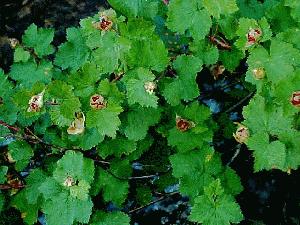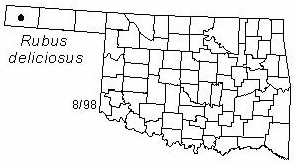 Low growing shrub or vine. Twigs red-brown, finely pubescent. Leaves alternate, simple, reniform, shallowly lobed above the middle, 3.3-5 cm (1.3-2 in) long and wide; glabrous above, pubescent beneath; cordate at base, obtuse at apex, margins serrate; stipules scarious. Inflorescence a solitary, showy flower, 3.8-6 cm (1.5-2.3 in) in diameter; calyx 5-lobed, pubescent or semi-glandular; petals 5, white; pistils many, inserted on hypanthium; stamens numerous; flowers appear from May to June. Fruit an aggregation of drupelets, about 13 mm (0.5 in) in diameter, hemispheric, dark purple; fruits mature July to September.
Low growing shrub or vine. Twigs red-brown, finely pubescent. Leaves alternate, simple, reniform, shallowly lobed above the middle, 3.3-5 cm (1.3-2 in) long and wide; glabrous above, pubescent beneath; cordate at base, obtuse at apex, margins serrate; stipules scarious. Inflorescence a solitary, showy flower, 3.8-6 cm (1.5-2.3 in) in diameter; calyx 5-lobed, pubescent or semi-glandular; petals 5, white; pistils many, inserted on hypanthium; stamens numerous; flowers appear from May to June. Fruit an aggregation of drupelets, about 13 mm (0.5 in) in diameter, hemispheric, dark purple; fruits mature July to September.
Distribution: Rocky Mountains in New Mexico, Colorado, Wyoming. Restricted to northwest Cimarron County in Oklahoma.
Habitat: rocky slopes and ravines.
Comment: Rubus is a Roman name meaning red; deliciosus refers to the flavorful fruits.
Field identification: this is the only species of Rubus that does not have compound leaves.
Food uses: fruits are eaten raw or used in jams, jellies, and sauces.
Wildlife benefits: fruits are eaten by many species of birds and mammals.
NWI status: none
Distribution in Oklahoma: 
BACK
NEXT
RETURN TO INDEX
Last update: 9/17/99
 Go to Oklahoma Biological Survey Home Page
Go to Oklahoma Biological Survey Home Page
 Disclaimer
Disclaimer